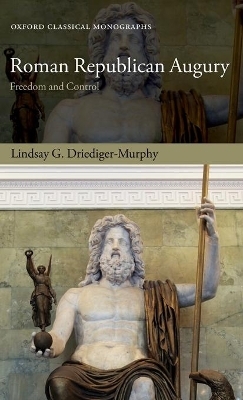
Roman Republican Augury
Oxford University Press (Verlag)
978-0-19-883443-4 (ISBN)
Roman Republican Augury: Freedom and Control proposes a new way of understanding augury, a form of Roman state divination designed to consult the god Jupiter.
Previous scholarly studies of augury have tended to focus either upon its legal-constitutional effects or upon its role in maintaining and perpetuating Roman social and political structures. This volume makes a new contribution to the study of Roman religion, politics, and cultural history by focusing instead upon what augury can tell us about how Romans understood their relationship with their gods.
Augury is often thought to have told Romans what they wanted to hear. This volume argues that augury left space for perceived expressions of divine will which contradicted human wishes, and that its rules and precepts did not permit human beings to create or ignore signs at will. This analysis allows the Jupiter whom Romans approached in augury to emerge as not simply a source of power to be channelled to human ends, but a person with his own interests and desires, which did not always overlap with those of his human enquirers. When human will and divine will clashed, it was the will of Jupiter which was supposed to prevail. In theory as in practice, it was the Romans, not their supreme god, who were bound by the auguries and auspices.
Lindsay G. Driediger-Murphy is an Assistant Professor in Latin and Roman Social/Religious History at the University of Calgary, Canada. After completing a DPhil in Ancient History at the University of Oxford in 2011 she became a Stipendiary College Lecturer at Oriel and Jesus Colleges, Oxford, before moving back to Canada to take up her current post. Her research and teaching focus on the religious history of the ancient world.
Frontmatter
Texts and Abbreviations
0: Introduction
0.1: Of Gods and Men
0.2: Why Now?
0.3: What Is Needed?
0.4: How? Four Guiding Principles
1: Do As I Say, Not As I Do? Report versus Reality in Augury
1.1: Introduction
1.2: Principle 1 in the High and Late Empire: Comments on Signification
1.3: Principle 1 in the High and Late Empire: Claims that Augural Rules Gave Humans the Freedom to Accept or Reject Signs
1.4: Principle 1 in the Middle (and Late) Republic: Claims that Human Awareness of Signs Determined their Validity
1.5: Principle 2 in the Early Principate: The Claim that Augural Rules Gave Humans Freedom to 'Create' Signs by Reporting Them
1.6: Principle 2 in the Late Republic: The Claim that Humans Contrived Auspication so as to Receive Favourable Signs and Avoid Receiving Unfavourable Ones
1.7: Conclusions
2: Convenience or Conversation? Why 'Watching the Sky' was More than Wishful Thinking
2.1: Introduction
2.2: What Was Sky-Watching?
2.3: Did Sky-Watching Invariably Produce Signs?
2.4: Was Sky-Watching Technically Sufficient to Prohibit Assemblies?
2.5: Possible Objections: The Timing of Servare de Caelo
2.6: But Would It Actually Work?
Appendix: Ancient References to the Bibulus Affair
3: Out of Control? The Effects of Augury on Roman Public Life
3.1: Introduction
3.2: Motives, Part 1: Cicero, the Augurium Salutis, and the Limits of our Knowledge
3.3: Motives, Part 2: Two Methodological Problems and Two Abdicating Consuls
3.4: Motives, Part 3: The Consul, his Colleague, a Tribune, and Roman Respect for Augury
3.5: The Dynamics of State Divination
3.6: But Did It Really Matter?
3.7: Conclusion: When Signs Said No
4: Conclusion
Endmatter
Bibliography
Index Locorum
General Index
| Erscheinungsdatum | 19.04.2019 |
|---|---|
| Reihe/Serie | Oxford Classical Monographs |
| Verlagsort | Oxford |
| Sprache | englisch |
| Maße | 157 x 223 mm |
| Gewicht | 480 g |
| Themenwelt | Geschichte ► Allgemeine Geschichte ► Vor- und Frühgeschichte |
| Geschichte ► Allgemeine Geschichte ► Altertum / Antike | |
| Geschichte ► Teilgebiete der Geschichte ► Kulturgeschichte | |
| Geschichte ► Teilgebiete der Geschichte ► Religionsgeschichte | |
| Geisteswissenschaften ► Religion / Theologie | |
| ISBN-10 | 0-19-883443-8 / 0198834438 |
| ISBN-13 | 978-0-19-883443-4 / 9780198834434 |
| Zustand | Neuware |
| Haben Sie eine Frage zum Produkt? |
aus dem Bereich


